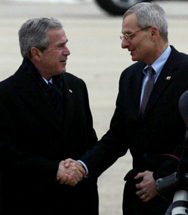


 |
 |
 |
|||||||||||
|
|
|
||||||||||||
|
|
|
|
|
|
|
|
|
|
|
|
|||
|
|
|
|
|
|
|
|
|
|
|
|
|
|
|

|
Amachi
Mentor Receives USA Freedom Corps Award “I’m not sure why I was chosen,” said Bulkley. “I know other people who are involved with Amachi, and I have not done anything to distinguish myself from anyone else in the program. I feel that the choice should really reflect on the President’s interest in faith-based initiatives and promoting the Amachi program.” Bulkley may not feel outstanding compared to other Amachi mentors; however his commitment to mentoring his now 15-year-old mentee is outstanding. Bulkley and his mentee were one of the first matches made with Proclamation Church in the Philadelphia Amachi program in 2001. Shortly after the two were matched, Bulkley introduced his mentee to the Boy Scouts and since that time has been responsible for transporting him to and from Scout meetings and camping trips. The mentee quickly embraced the new experience. “[Boy Scouts] is the one thing that he has that gives him a purpose,” Bulkley said. Seeing his mentee’s growth as a leader has been Bulkley’s best experience as a mentor. His mentee is currently a patrol leader in his troop. “He’s done really well in Boy Scouts,” said Bulkley. “[My mentee] is a kid with a lot of ability. I’ve seen a lot of good growth, and I think the leaders in the Scout troop have seen that too. That’s why they wanted to send him to the Scout camp.” The troop leaders, as well as others in the community have raised about $1500 to sponsor his mentee for the Philmont Scout Ranch, a high-adventure camp in New Mexico. Bulkley said being a mentor for the last three and a half years has made him much more aware of the depth of issues facing families of the incarcerated. “I think the experiences of myself and other people in the program just show the incredible need we have to support the family structure and to strengthen whatever we can—through the government, through the church, through all organizations—to support the families,” he concluded.
Spring 2005
|